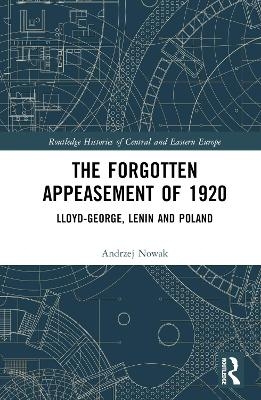
The Forgotten Appeasement of 1920
Routledge (Verlag)
978-1-032-43463-6 (ISBN)
The outcome of this attack might have been the occupation of all of Poland and East Central Europe, and a Red Army sweep further west. This book probes the British–Soviet negotiations and diplomatic operations behind the scenes. Professor Nowak uses hitherto unexamined documents from Russian and British archives to show how (and why) top British politicians were ready to accept a new Russian imperial control over the whole of Eastern Europe. Nowak unravels this previously untold story of that first and forgotten appeasement, stopped only by the Polish military victory over the Red Army. His excellent historical craftsmanship and new sources contribute to the book’s quality, filling up a lacuna in contemporary historiography.
This book will appeal to researchers of geopolitical affairs and the Great Powers, the history of Poland, and the political mentality of Western elites. It will also be of interest to university students and tutors, scholars of history and international relations and – thanks to the book’s brisk and fascinating narrative – amateur historians and history aficionados.
Andrzej Nowak is Professor of East European History at the Jagiellonian University. His research focuses on Polish and Russian history and comparative studies of empires. He has published many books including a multivolume History of Poland, History and Geopolitics, and Metamorphoses of the Russian Empire: 1721-1921.
Part 1: The dream of an independent Poland and "concepts of the world" 1. Trouble with Polish independence 2. Limits to the power (and imagination) of the winners: a view from Versailles 3. Was Piłsudski a tool in French hands? France and Poland’s Eastern policy (January – April 1920) 4. Powerlessness: Washington respecting the Soviet Empire and the threat to Polish independence. Part 2: The Polish crisis: a short course 1. Between Lloyd George’s brand of peace and peace – Piłsudski style (January – April 1920) 2. The game for Ukraine (May 1920) 3. Toward the Curzon Line (June – July 1920) 4. The Politburo’s response (July 1920) 5. Peace at any price (to Poland) Part 3: How does the imperial brain work? 1. Balfour, or shunning chaos 2. Lewis Namier, or revenge on a map (of Poland) 3. Kerr and Hankey, the two secretaries 4. The right man in the wrong place: Horace Rumbold in Warsaw 5. Lloyd George and his powerless ministers Curzon and Churchill 6. The Vox Populi and its representatives 7. The brainstorm and its "appeasement" (June – August 1920) 8. Coda Part 4: Polish annexes and questions 1. Left hand side free: Piłsudski’s policy of appeasement 2. Questions about the Peace of Riga
| Erscheinungsdatum | 11.07.2023 |
|---|---|
| Reihe/Serie | Routledge Histories of Central and Eastern Europe |
| Zusatzinfo | 1 Line drawings, black and white; 15 Halftones, black and white; 16 Illustrations, black and white |
| Verlagsort | London |
| Sprache | englisch |
| Maße | 156 x 234 mm |
| Gewicht | 680 g |
| Themenwelt | Geschichte ► Allgemeine Geschichte ► Neuzeit (bis 1918) |
| Geisteswissenschaften ► Geschichte ► Regional- / Ländergeschichte | |
| Geisteswissenschaften ► Philosophie | |
| Sozialwissenschaften ► Politik / Verwaltung ► Politische Systeme | |
| Sozialwissenschaften ► Politik / Verwaltung ► Politische Theorie | |
| Sozialwissenschaften ► Soziologie ► Spezielle Soziologien | |
| ISBN-10 | 1-032-43463-5 / 1032434635 |
| ISBN-13 | 978-1-032-43463-6 / 9781032434636 |
| Zustand | Neuware |
| Informationen gemäß Produktsicherheitsverordnung (GPSR) | |
| Haben Sie eine Frage zum Produkt? |
aus dem Bereich


